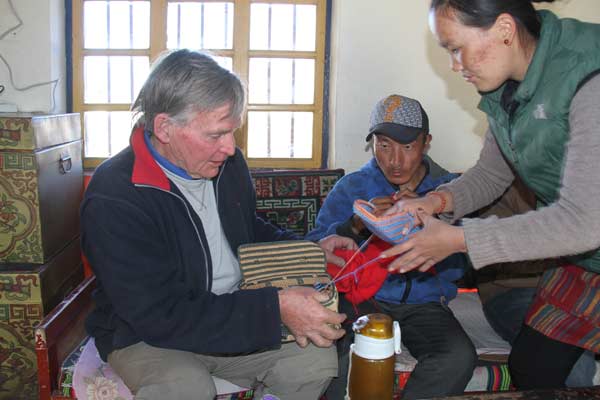 |
| Photo Provided to China Daily |
He started by aiding the school financially, but when she asked him if he would be interested in teaching organic farming to visually impaired people in Tibet, Parent immediately agreed. In 2005, he started showing how to plant vegetables and crops on a very small piece of land.
According to Parent, with 1-square-meter of land, visually impaired people need only to stretch out their hands to cultivate and harvest vegetables.
The school has six greenhouses for planting crops, and 12 mini greenhouses that they use for teaching. And Parent also teaches the students how to produce organic fertilizer.
"We feed 100 people three meals a day ourselves," says Parent proudly.
According to official statistics, 30,000 of the 2.5 million inhabitants of the Tibet autonomous region are visually impaired. Compared to most areas in the world, this is well above the average ratio. "Before I came to the blind village, I had never seen the brighter world. I am happy here because I found equality here," says Tsering, 35, from Tibet's Shannan prefecture, who lost his sight four years ago.
Parent says many adult visually impaired people such as Tsering really love the community and are reluctant to leave.
"It is one of our difficulties. The donors don't want it to be a retirement home for blind people. But after they have learned how to make bread and it is time to leave, they find it hard to say goodbye."


 Heavy cargo flights taking off
Heavy cargo flights taking off In pictures: PLA's digital equipment
In pictures: PLA's digital equipment  Americans mark Thanksgiving Day with parades
Americans mark Thanksgiving Day with parades Love searching stories in cities
Love searching stories in cities  Shanghai shrouded in heavy fog
Shanghai shrouded in heavy fog Office ladies receive ‘devil’ training in mud
Office ladies receive ‘devil’ training in mud China's first nude photographer
China's first nude photographer Selected sports photos of the week
Selected sports photos of the week Treasure of Chinese culture- Nuo Dance
Treasure of Chinese culture- Nuo Dance  Youths in Night club: photo story
Youths in Night club: photo story Models dazzle at Int'l Yacht Model Pageant
Models dazzle at Int'l Yacht Model Pageant  Crystal scenery in China: Jilin fog glaze
Crystal scenery in China: Jilin fog glaze  Tianjin holds first pole dance championship
Tianjin holds first pole dance championship  Annual Santa Claus parade held in Canada's Montreal
Annual Santa Claus parade held in Canada's Montreal China's aircraft carrier passes through Taiwan Strait
China's aircraft carrier passes through Taiwan StraitDay|Week|Month